Stage Door: The restless moving "Chains"
 Monday, July 11, 2022 at 7:31PM
Monday, July 11, 2022 at 7:31PM 'Stage Door' is our new theater column. We'll review plays and musicals but, because this is a film site, we'll end each column with related movie suggestions. - Editor
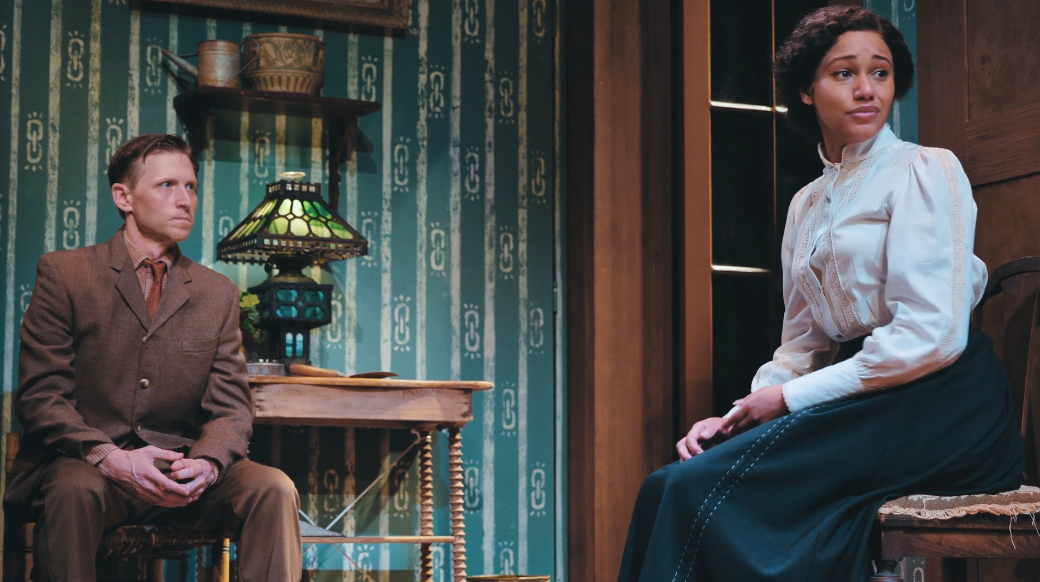 Mr & Mrs Charlie Wilson, the suddenly precarious couple at the heart of "Chains"
Mr & Mrs Charlie Wilson, the suddenly precarious couple at the heart of "Chains"
The work of British playwright Elizabeth Baker (1876-1962) has never been adapted to the cinema but not for lack of worthiness. Her most famous play, "Chains", is currently enjoying a revival Off Broadway. On the night we attended we learned, via the introduction, that the Mint's artistic director worried during its pandemic-forced delay that "Chains" might not resonate to modern audiences. The Mint forged ahead anyway only to realize that the fears were unfounded; class struggle and existential dilemmas are timeless topics...
Charlie Wilson and Lily Wilson (Jeremy Beck and Lakaan McHardy) are a happily married couple with a lovely small home. To supplement Charlie's stable but hardly hefty income as a clerk, they rent out one of their rooms. Early in the play's first act we learn that their current lodger, an amiable bachelor named Freddy (Peterson Townsend), has quit his job and will very quickly relocate to far-flung Australia to seek his fortune. The news generates tittering gossip amongst their friends, family, and colleagues. It hits Charlie much differently, sending him into something of an existential crisis.
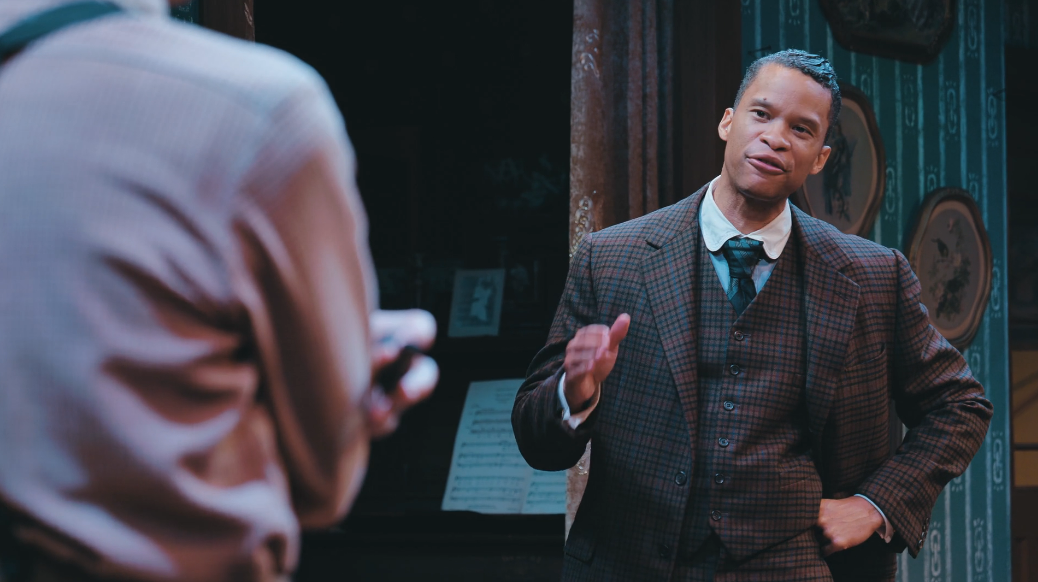 Freddy makes a leap of faith. He's off to Australia.
Freddy makes a leap of faith. He's off to Australia.
In the first act you might reasonably question how much dramatic juice Chains can get from Freddy's leap of faith. Each character we meet is drawn into this same conversation. Even when we switch locations to Lily's family home, it's the leading topic and the responses often minor variations of "that's absurd!" Aside from Charlie the only character who is spurred toward soul-searching rather than judgment is his sister-in-law Maggie (Olivia Gilliat) who begins to reconsider her own monotonous but safe future as she's about to marry a wealthy man she doesn't love.
Despite the play's risks in repetition --Freddy's news stays stubbornly on everyone's lips for the entire duration-- Chains doesn't grow dull but only becomes more moving in its paralysis over this one topic. Freddy's news becomes a divining rod for characterization and theme as Baker's sly writing somehow deftly weaves multiple marital and courtship dramas, sibling relations, peer pressure angst, and economic anxiety with this one topic. Risk is anathema to these anxious members of the Edwardian working class. That familiar hymn of gratitude, "Count Your Blessings", sours in the context of this fine production. It transforms into a mandatory haunted mantra, a prison sentence.
[Chains plays at Theatre Row on 42nd Street and has been extended through Saturday July 23rd.]
Adjacent Movie/TV Recommendations
As stated Baker's work has never been adapted to film. There were a couple of British television productions, though, filmed shortly before her death..
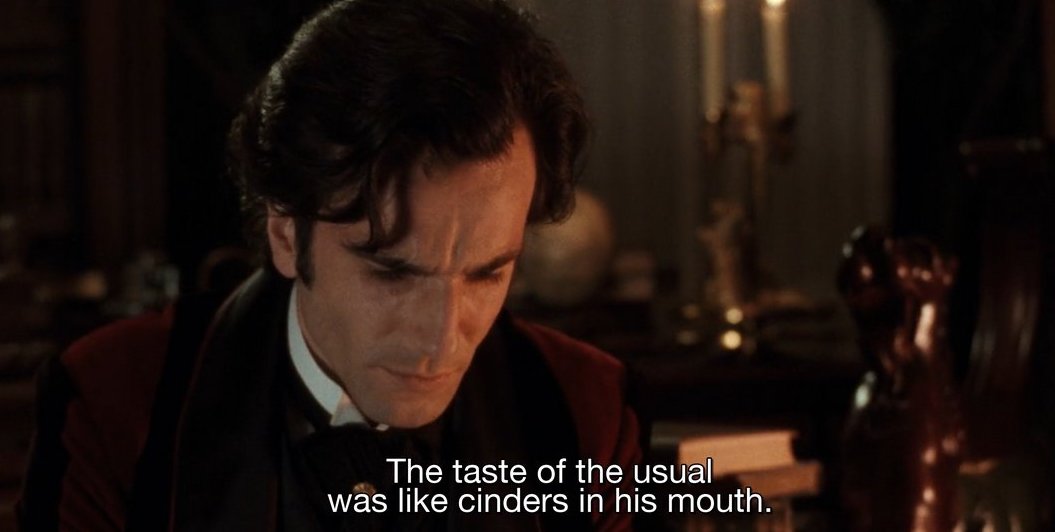
THE AGE OF INNOCENCE (1993)
Though the setting and time frames are different (1870s Gilded Age in New York for Wharton / 1900s Working Class London for Baker), there's one scene that is shockingly similar both in its placement in the narrative and its emotional heft. Unfamiliar with Baker I assumed she was influenced by Wharton but as it turns out "Chains" preceded Wharton's classic by 11 years so perhaps it was the other way around. Either way both female artists were thinking along very similar lines in one aspect, beautifully illuminating the way repressive societal expectations are commonly enforced by intimates like friends and family and neighbors, rather than the more abstract "society" or government. [Available to rent from most services]
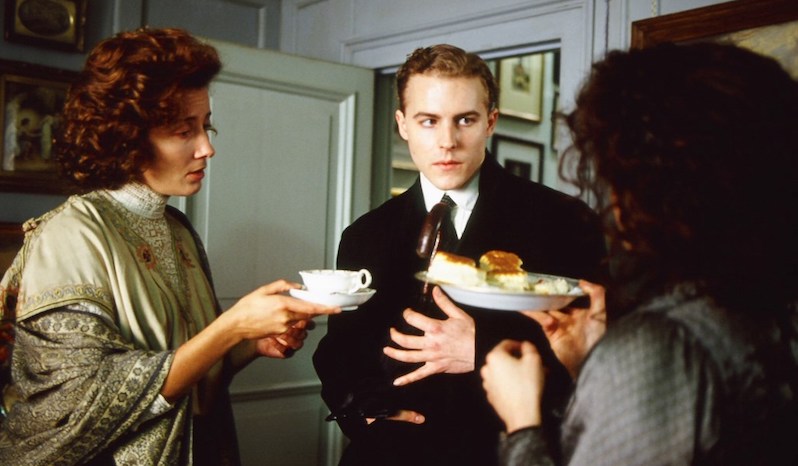
HOWARDS END (1992)
Any excuse to rewatch Howards End is a good one. We bring it up in the context of Chains because the play's protagonist Charlie Wilson is, in many ways, a more stable (for the moment) variation of Leonard Bast (Samuel West) from E.M. Forster's Howards End. Bast is the clerk that the wealthier Schlegel Sisters (Emma Thompson & Helena Bonham-Carter) befriend. Howards End is an absolute masterpiece and one of the (many) reasons is its deft handle on class relations and the privileges afforded by wealth versus the instability and vulnerability of the middle and lower classes. The Schlegels accidentally ruin Bast's life by pushing him towards a new and better job, rather than the alternative: sticking with his daily drudgery. In scene after scene of Chains we realize that Wilson isn't any safer than Bast, despite more trappings of success like his cute little home (which he can't afford without making space for lodgers). His own version of the Schlegel Sisters is in the less aggressive form of his equally restless sister-in-law. In the end and just off-stage (if you will), he's at the mercy of his employers and the whims of capitalism. Just like poor Leonard Bast. [Available to stream on TUBI or to rent from most services]
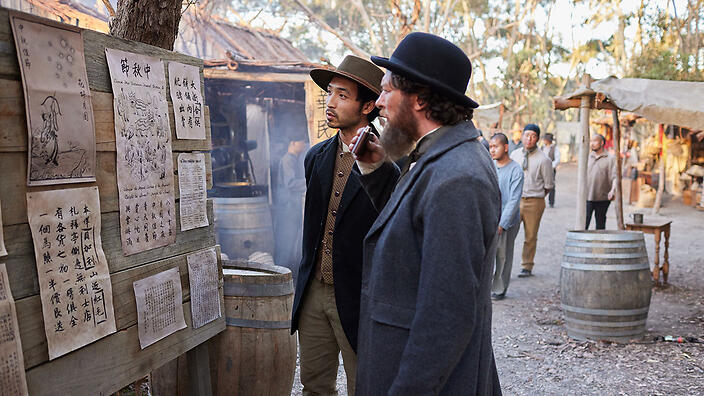
THE FURNACE (2020) / NEW GOLD MOUNTAIN (2021)
Cheating a bit as we haven't seen these two recent telefilms/series, but both appear to have been well received. The Australian Gold Rush which began in the late 1850s and stretched on for some 50 years affected countless lives as people emigrated from multiple countries (but especially the UK) to seek their fortune in a new land. New Gold Mountain is a miniseries focusing on the little discussed story of Chinese immigration to Australia. The Furnace, starring the always welcome David Wenham (Lion, Australia, Top of the Lake) as a mysterious bushman, is set towards the end of the gold rush, taking place shortly before the events of Chains. The Furnace's other protagonist is an Afghan man (AACTA nominee Ahmed Malik) on the run with gold treasure (which technically belonged to the Crown, since Australia was a British colony until 1901). Both of these stories focus on people of color which makes for an interesting angle since the story of the country's settling and colonization obscured what was happening to the indigenous population for decades until the world became more race conscious. Chains never mentions race, but the color-blind casting brings these stories to mind... especially since the catalyst character of Freddy, though not one of the leads, is played by a black actor.
It's a fascinating time period in Australian history and after seeing "Chains" we're desperate to know more about it. Since The Film Experience has always had a healthy portion of Australian readers, we're hoping some of YOU will have suggestions about films or television series set in the 19th and early 20th centuries that would better illuminate this era in Australia and why brave or restless Brits like Freddy and Charlie would consider leaving everything behind to remake their lives there. [New Gold Mountain is available to stream on AMC / Roku, The Furnace is available to rent on various platforms]

Previous Episodes
The Girl From the North Country (recently closed) / Little Shop of Horrors (open run)



Reader Comments (5)
I so enjoy this new column!
Finbar -- thank you! i'm glad.
I've never heard of Baker or Chains. This play sounds excellent. What a fascinating theme. And you've got me intrigued by the idea that the more the play explores this theme the more moving it becomes.
Sorry if this is a bit unrelated but that image of the Schlegel sisters and Leonard Bast is a wonderful blast from the past. I so identify with Mr Bast in the story - the tragic dreamer, a pre-Freudian romantic who was too fragile for this and that world. Remember that walk in the woods with those violets in the late afternoon glow? Unforgettably etched in my mind even now.
Nathaniel - as someone who also patronises theater (I am more of the Public Theater and Off-Broadway kinda guy), how safe is it to be in theaters? My wife who is connected to the theater industry is more courageous than I am in participating theater productions, but I prefer the Leonard Bast role of listening to her talk while I engage with my own thoughts based on her stories.
Owl --- honestly i'm not sure why people are scared to go into theaters. You can still wear a mask (and in most places you're encouraged to!) i am double vaxxed and boosted and I never worry about these things. Life was meant to be lived. If you do your part (vaxxed, boosted, masked) why then worry about it?